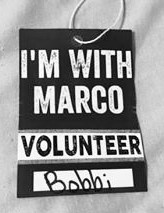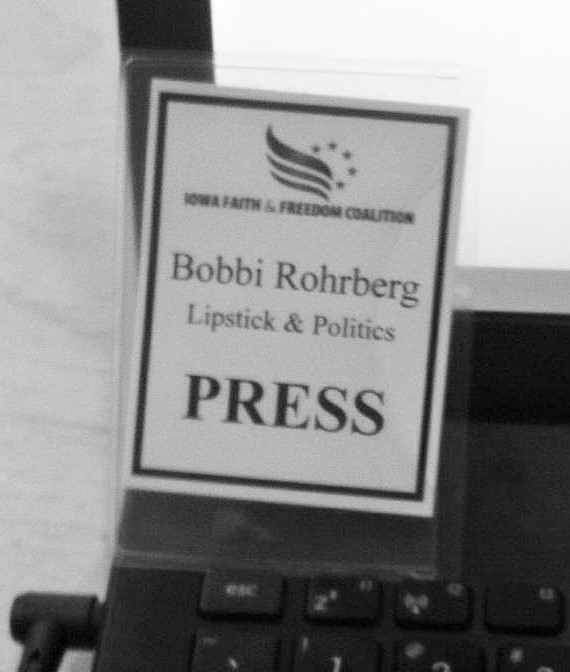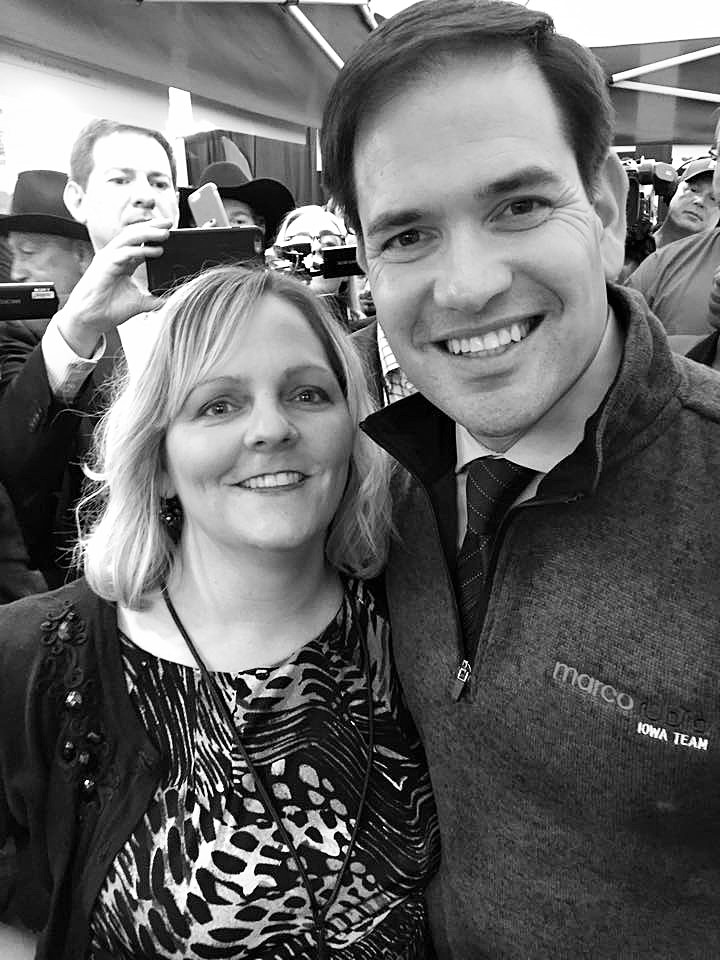
Each election cycle, we are subjected to endless stories about voter apathy. We live in a world where people binge-watch political shows like Veep and House of Cards for hours on end, but can’t be bothered to drive across town and pull a lever or fill in a bubble at the ballot box. While voting is incredibly important–really, it’s a civic duty–it’s a good idea to get involved before the election. America is the land of opportunity, and one of those is the opportunity to help shape our country by taking an active role in the election process. As an Iowan, I’m excited our state becomes relevant every four years, thanks to our “First in the Nation” Caucus. I’ve been volunteering on the campaign trail this election cycle, and it has been an incredibly rewarding experience.
Think of it this way–if you devote time to cheering your sports team on their way to the World Series or the Super Bowl, why not support the person you’d like to see as the next leader of our nation? Getting informed about the candidates, choosing one to support, and volunteering are great ways to take part before Election Day.
Every candidate has a website, and they all have VOLUNTEER headings you can click on to get more information. Trust me, they can’t wait to hear from you. I know, because I’m a campaign volunteer myself, and the campaigns are always looking for people eager to pitch in and lend a hand. So if you are thinking you’d like to volunteer, I can’t say it strongly enough–you should definitely do it. That being said, there are a few things you should keep in mind as you become a part of the political process.
- It’s not about you: This should seem obvious. Your name is not on the giant banner at campaign HQ, right? Right. Still, some want to cherry pick their volunteer opportunities. In my work at the Iowa Headquarters for Senator Rubio, I’ve seen our regional field director mopping the bathroom floor, because at the end of the day, the more things you do from within the less money the campaign has to spend to hire it out. I’ve been the one standing with a clipboard in the back of the room during a speaking event, waiting to sign up potential caucus goers. I’ve put up and taken down chairs at such an event. Volunteering could mean making phone calls to potential supporters, or knocking on doors to recruit people to your candidate’s team. At one event, it was my job to point the way to the event venue and direct people to the restrooms. There’s no job too big, and none too small. There are just things that need to be done, and you are there to do them.
- Be willing to step out of your comfort zone: One of the major needs many campaigns have is for phone bank volunteers. Basically, that means calling a list of people and asking them questions, such as whether they plan to vote in their caucus/primary and if they have decided for whom they want to vote. Personally, I would rather have blood drawn by a first-year nurse than talk on the phone, even to people I know and like, let alone to strangers. Still, it is an essential part of campaigning, and as already mentioned, it’s not about you–or me. It’s about the candidate and what will most benefit them. So, you have to be willing to step outside of your comfort zone. Most of the campaign efforts focus on outreach, because the only way to win is to attract people to your candidate and to get them committed to voting/caucusing. You can’t do that by standing quietly in the corner. You have to engage, whether it’s face-to-face at a speaking event, over the phone doing phone banking, or even knocking on doors around your neighborhood to get the word out to others.
- Do not expect face time with your candidate: Let’s be honest here–if you do the research, and find a candidate you really want to support, it only makes sense that you’d want to meet them and tell them you support their efforts. There’s nothing wrong with that, and at many events there are opportunities to do just that. Still, when you volunteer at an event you are there to work, not to hang with the candidate. When working at the campaign office, the majority of the time the candidate is not there because, obviously, their job is to be out campaigning. If you are in-office making calls or out door-knocking, you aren’t going to be rubbing elbows with your candidate of choice. Even during speaking events where the candidate is present, you may be standing outside the venue signing in the late arrivals. At the end of the event, when the candidate is shaking hands and taking pictures, you’ll be trying to catch people as they leave to see if they will commit to vote/caucus for your candidate. If you simply want to meet the candidate, go and do that. If you want to help the candidate, volunteer.
- You are an extension of the candidate: When you are at work, what you do reflects on your employer. You cannot go around being rude to customers, or arguing with people who don’t like your product. The same is true when you volunteer. You are an extension of the candidate—you must be willing to engage with anyone and everyone. I’ve had times during phone banking when the person on the other end yelled or cursed at me. I thanked them for their time and ended the call–assuming they hadn’t already hung up. People sometimes have doors slammed in their face when door-knocking. Don’t be combative in return. Your job is to be a happy warrior, standing in for your preferred candidate. If someone says they don’t like your guy/gal, be pleasant and respectful. You never know, they may come around eventually. I had a man tell me he was torn between Cruz and Rubio, and by the end of the call he said I’d been so polite and “not pushy” that he thought he’d probably go with Rubio. That’s the goal–leave the potential voter with the impression that your team is supportive and positive, something they should want to be a part of themselves. Once, during phone-banking, another worker was talking to a man who snapped at her for interrupting his evening. Then he overheard laughter coming from the office, where a few of us were joking around between calls. He wanted to know where she was and what was going on that was so funny. She explained and he said it was nice to know that people were having fun working together, and by the end of the call he actually thanked her for calling. It doesn’t happen all of the time, of course, but you never know what a potential voter will notice, so always put your best foot forward.
- Know your role: This doesn’t apply to everyone, but it’s still important to keep in mind. When you are volunteering, your job is–clearly–volunteering for your candidate. If you have another job that could come in conflict, you must focus on keeping the two separate. For example, I am a contributor for Lipstick and Politics, and I also contribute for a few other sites from time to time. If I am at an event as a member of the media, it is my job to report the story, which means if there are multiple candidates, I talk about all of them, not just the one I support. I’m not there to ask people to caucus for my candidate, or to tell others why they should support the person I support. I’m there to report events from the day. That doesn’t mean I can’t talk about my candidate when I write, it just means that, depending on my role, I shouldn’t focus on that candidate to the exclusion of the others. Conversely, if I am there as a volunteer, I don’t get to sneak over to the media section and take the great photos or get the quotes I love to post on Twitter when I’m there as media. Side note–if you are volunteering at an event where media is present, don’t ask anyone with a media badge to vote for your candidate. I’ve seen it happen, and it’s awkward, because often the media is there from out of state and can’t vote/caucus anyway, and even if they could, they are currently in their reporting role, not the role of potential voter. One of the perks of being media at political events is that campaign workers tend to leave you alone and let you work. Honor that.

Lest this list of guidelines make you think volunteering is endless drudgery, fear not. It is anything but boring or tedious! You are working with others toward a common goal, which bonds you with fellow team members from the start. There’s a sense of community that develops, especially if you volunteer regularly. There is a lot of laughter and camaraderie when you work with a campaign. There’s an excitement you feel when working events and interacting with people you’re meeting for the first time. Most importantly, there’s a satisfaction that comes from dedicating time and energy to something that matters to you, and that is part of a greater purpose.

